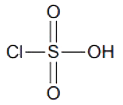
Specifications
Appearance Pale yellow to amber coloured liquid pH Acidic Strength (by titration) 98% w/w minimum Free sulfur trioxide 0.5% w/w maximum Chloride as HCl 0.5% w/w maximum Fe content 50 ppm maximum
| Molecular formula |  |
| Molecular weight | 116.5 |
| CAS number | 7790-94-5 |
| EINECS number | 232-234-6 |
| Melting point | -80°C |
| Boiling point | 158°C |
| Vapour pressure | 1 mmHg at 20°C |
| Specific gravity | 1.74 to 1.76 at 20°C |
Description
Chlorosulfonic acid is a pale yellow to amber coloured fuming liquid with a strong odour. It hydrolyses in the presence of water.
Applications
Intermediate for chemicals and dyes
Packaging
Chlorosulfonic acid is available loose in tanker.
Storage and handling
Keep the container dry. Do not breathe the gas | fumes | vapours | spray. Never add water to this product. In case of insufficient ventilation, wear suitable respiratory equipment. If ingested, get immediate medical advice. Avoid contact with skin and eyes. Keep away from incompatible materials such as reducing agents, organic materials, metals, alkalis and moisture. It may corrode metallic surfaces. Store in a metallic drum using a strong polyethene inner package. Always refer to the Safety Data Sheet (SDS) for detailed information on storage and handling.
Safety
Wear personal protective equipment (PPE). Ensure adequate ventilation. Prevent breathing of mist or vapours. Prevent contact with skin, eyes and clothing. Always wear a self-contained breathing apparatus or a full-face airline respirator while using this chemical. Refer to the SDS for detailed information on safety.
First aid
Eye contact: Immediately flush eyes with running water for at least 15 minutes, keeping the eyelids open. Cold water may be used. Do not use an eye ointment. Get immediate medical attention.
Skin contact: Remove contaminated clothing as quickly as possible, protecting the hands and body. Place the individual under a deluge shower. If the chemical falls on exposed skin, wash the affected area gently and thoroughly with running water and non-abrasive soap. Wash contaminated clothing before reuse. If irritation persists, get immediate medical attention.
Ingestion: Do not induce vomiting. Loosen tight clothing such as a collar, tie, belt or waistband. Call a physician.
Inhalation: Allow the individual to rest in a well-ventilated area. If the individual is not breathing, give artificial respiration. If breathing is difficult, give oxygen. Call a physician.
